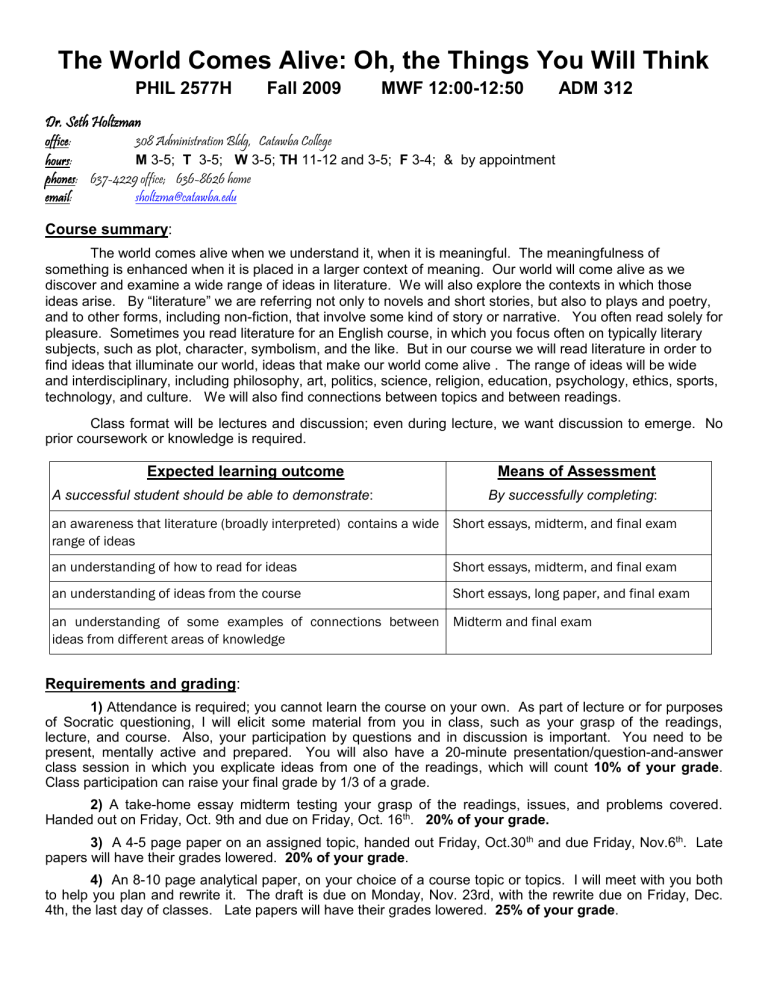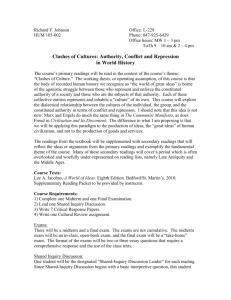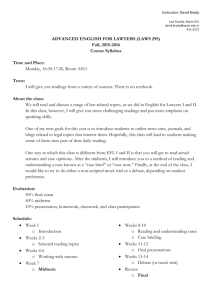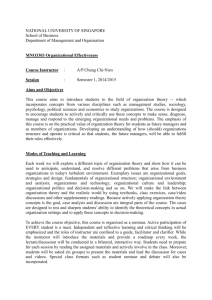The World Comes Alive - Catawba College Faculty Website

The World Comes Alive: Oh, the Things You Will Think
PHIL 2577H Fall 2009 MWF 12:00-12:50 ADM 312
Dr. Seth Holtzman
office: 308 Administration Bldg, Catawba College hours: M 3-5; T 3-5; W 3-5; TH 11-12 and 3-5; F 3-4; & by appointment phones: 637-4229 office; 636-8626 home email: sholtzma@catawba.edu
Course summary
:
The world comes alive when we understand it, when it is meaningful. The meaningfulness of something is enhanced when it is placed in a larger context of meaning. Our world will come alive as we discover and examine a wide range of ideas in literature. We will also explore the contexts in which those ideas arise. By “literature” we are referring not only to novels and short stories, but also to plays and poetry, and to other forms, including non-fiction, that involve some kind of story or narrative. You often read solely for pleasure. Sometimes you read literature for an English course, in which you focus often on typically literary subjects, such as plot, character, symbolism, and the like. But in our course we will read literature in order to find ideas that illuminate our world, ideas that make our world come alive . The range of ideas will be wide and interdisciplinary, including philosophy, art, politics, science, religion, education, psychology, ethics, sports, technology, and culture. We will also find connections between topics and between readings.
Class format will be lectures and discussion; even during lecture, we want discussion to emerge. No prior coursework or knowledge is required.
Expected learning outcome Means of Assessment
A successful student should be able to demonstrate : By successfully completing : an awareness that literature (broadly interpreted) contains a wide range of ideas
Short essays, midterm, and final exam an understanding of how to read for ideas an understanding of ideas from the course
Short essays, midterm, and final exam
Short essays, long paper, and final exam an understanding of some examples of connections between ideas from different areas of knowledge
Requirements and grading
:
Midterm and final exam
1) Attendance is required; you cannot learn the course on your own. As part of lecture or for purposes of Socratic questioning, I will elicit some material from you in class, such as your grasp of the readings, lecture, and course. Also, your participation by questions and in discussion is important. You need to be present, mentally active and prepared. You will also have a 20-minute presentation/question-and-answer class session in which you explicate ideas from one of the readings, which will count 10% of your grade .
Class participation can raise your final grade by 1/3 of a grade.
2) A take-home essay midterm testing your grasp of the readings, issues, and problems covered.
Handed out on Friday, Oct. 9th and due on Friday, Oct. 16 th . 20% of your grade.
3) A 4-5 page paper on an assigned topic, handed out Friday, Oct.30
th and due Friday, Nov.6
th . Late papers will have their grades lowered. 20% of your grade .
4) An 8-10 page analytical paper, on your choice of a course topic or topics. I will meet with you both to help you plan and rewrite it. The draft is due on Monday, Nov. 23rd, with the rewrite due on Friday, Dec.
4th, the last day of classes. Late papers will have their grades lowered. 25% of your grade .
5) A final exam, testing your conceptual grasp of the course, not your memory of facts. Exam date:
Thursday, Dec 10th, 3:00
–6:00pm. Bring blue book; write in pen.
25% of your grade .
Complete assignments on time. Other expectations about your writing: typed, paginated, tidy (bound if needed), standard margins/fonts, & dark print. Failure to meet these will hurt your assignment grades. Your paper (not the essays) should have a cover page with name, course name/number, date, my name, and a title.
------------------------------- -----------------------------
Criteria employed in evaluating written work
:
Responsiveness to the Assignment
Writing should fulfill the purpose of the assignment directly and completely.
Content
Writing should reflect an understanding of the subject. It should make good use of the
relevent concepts, distinctions, positions, & reasons included in course readings or
brought out in lecture or discussion. It should be organized so ideas are arranged
logically & clearly. Main points should be backed by substantial & relevant details. Your
work should be backed by good reasons. Your claims & reasons should be consistent
with each other. Anticipate and respond to any reasonable objections.
Execution
Writing should use precise words & well-constructed sentences that clearly represent the
writer’s reasoning. It should adhere to conventions of grammar, capitalization, spelling,
& usage. Writing style should be appropriate to the academy. Your work should be
clearly written, its claims precise, its structure clear, with an explicit overall direction. It
should be intelligible to an interested student.
Citations and Documentation
Writers must clearly differentiate their own material from source material. When writers
use material that is not their own or not common knowledge, they must document the
source of the information using a standardized (i.e., either MLA or APA) method.
Criteria for Evaluating Oral Presentation Communication Skill:
1. Content: Appropriate subject matter; Mastery of subject matter
2. Structure: Clear and meaningful order within the assigned time frame
3. Style: Clarity; Vocabulary/Use of language
4. Delivery: Volume; Speed; Diction; Gestures; Facial expressions; Eye Contact
Criteria for Evaluating Discussion Facilitation Communication Skill:
5. Interest in the Material: Leader should be enthusiastic about the subject matter
6. Knowledge of Material and Resources: Leader should understand material & resources well enough to prompt class with meaningful discussion questions.
7. Involvement: Leader should encourage & value participation from everyone.
8. Discussion Structure: Discussion should proceed in logical patterns.
9. Time Management : Discussion should stay within allotted time & neither rush nor drag.
10. Clarity of Speech: Speech should be clear and intelligible.
--------------------------- -------------------------
Grading:
"A" Superior mastery
"B" Good mastery
“C” Satisfactory achievement
A+ 97-100 A 93-96 A- 90-92
B+ 87-89 B 83-86 B- 80-82
C+ 77-79 C 73-76 C- 70-72
“D” Less than satisfactory achievement D+ 67-69 D 63-66 D- 60-62
“F” Unsatisfactory achievement
A+ is not a possible final course grade. Grades can and should measure achievement only.
Texts
:
1) Zen & the Art of Motorcycle Maintenance, by Robert M. Pirsig
2) A Canticle for Leibowitz, by Walter M. Miller, Jr.
3) The Man Who Mistook His Wife for a Hat, by Oliver Sacksl
4) handouts
Reading and taking notes
:
There is a good bit of reading in this course. I expect you to do all of it; to do well in the course you will need to. Some material is easy and so accessible on your first attempt. Other assignments are quite taxing and will probably require multiple readings.
Lectures will sometimes track the readings but may also range far afield. Come to class having done the readings. You will be responsible for all of it, and the final exam will be frightening if you have not read it all. Since lectures can cover material not in the readings, this is another reason to attend each class. You cannot get by with noting only key terms and definitions. Your notes are an invaluable resource for understanding the course and for the final exam. This course focuses on understanding concepts and ideas, not on memorizing facts; your notes should reflect that.
Absences and violations
:
To keep attendance--and to learn names--I will institute a seating chart in the first few classes. Choose a permanent seat; see me to change it. I check attendance promptly at the start of class. If late, you might be counted absent; if late enough, you are absent. Avoid tardiness; if you are often late (without legitimate reason), I will choose to count you as absent. Sleeping and other forms of mental disconnect in class count as an absence. When absent, you are responsible for missed assignments and classroom material. Get notes from a classmate. If you still have questions, you may contact me.
No absences are excused. After 3 penalty-free absences, further absences lower your final grade: 4-5
= -1/3 grade, 6-8 total = -2/3 grade, 9-10 total = -1 grade. Over 10 absences (if no emergency) is grounds for an "F" (or "I" sometimes), regardless of your grades. Missing class just before/after vacation counts double.
Respect the people and ideas in our class. It is usually illegitimate to attack a person; you may challenge the person’s ideas. I don't care if you bring a drink, sport a hat, or wear rags. I care that you pay attention to me and others (no cell phones or activated pagers/beepers), that you are on time and ready to work, that you have a positive attitude, and that you make a positive contribution to the class.
Cheating, working with another student to complete individual assignments (unless specifically allowed), as well as falsifying an emergency to skip class or an assignment, all violate the Honor Code. So does plagiarism, employing a writer's ideas (and even words) without giving the writer due credit. See me if you have any question about borrowing someone's ideas or words for your use.
Order of Readings:
Novels: underlined.
Poems: in italics .
Short stories: in
bold
.
Plays: in "quotes".
Shelley: Frankenstein
Psalm 8
Coleridge: Rhyme of the Ancient Mariner
Donne: from An Anatomy of the World
Yeats: The Second Coming
Jewett: A White Heron
Bishop: The Fish
Giraudoux: “The Madwoman of Chaillot"
Silverberg: The Sixth Palace
Blake: Augeries of Innocence
Whitman: When I heard the learn’d astronomer
Hesse: Siddhartha
Roetke: In a Dark Time
Tao Te Ching
Cummings: you shall above all things be glad and young
Singer: Gimpel the Fool
Hopkins: Pied Beauty
Sophocles: “Antigone”
Samuel: And Even Beyond
Cummings: I thank you, God, for most this amazing
Lawrence: The Song of a Man Who Has Come Through
Dostoevsky: The Grand Inquisitor
Graves: In Broken Images
Ammons: Corsons Inlet
Wiesel: The Accident
Stevens: Less and Less Human, O Savage Spirit
Jeffers: The Great Explosion
Dugan: Love Song: I and Thou
Teasdale: Mastery
Rukeyser: This Morning
Tan: Half and Half
Arnold: Dover Beach
Eliot: The Hollow Men
Coleridge: Human Life
Silverberg: Passengers
Clough: The Latest Decalogue
Auden: The Unknown Citizen
Ionesco: “The Bald Soprano”
Olds: Last Night
Larkin: High Windows








